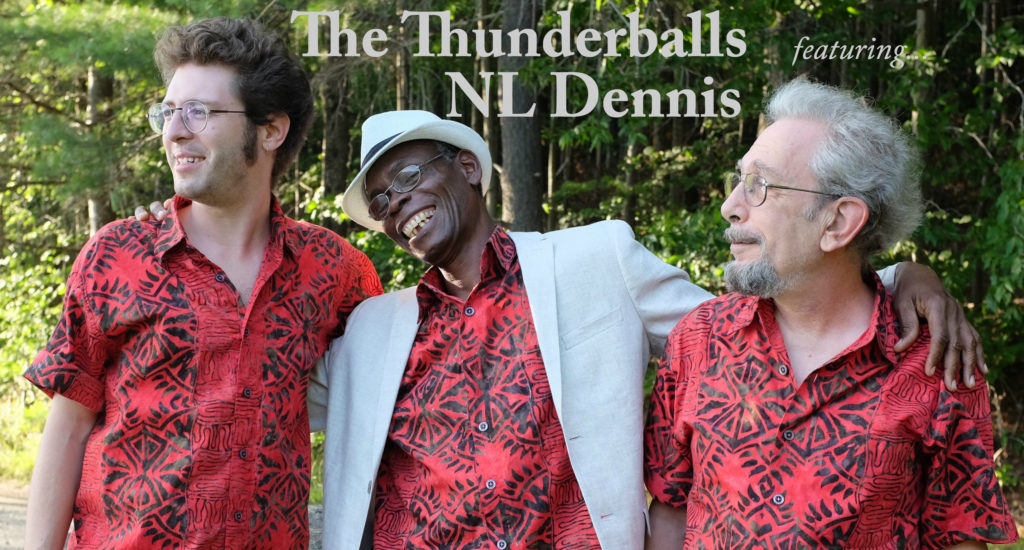History of the Thunderballs, Part 2: Home and Back Again, I Meet Weed Tree and the First Recording Session


If there’s one thing worse than slogging through a Vermont winter, it’s coming back to one after two weeks of baking in the glorious tropical sun. One would have hoped for some progress in the weather department, but if anything the frozen landscape looked more dismal than ever. The icy wind just snickered at us and bit right through the flimsy windbreakers that we clutched desperately about us as we made a mad dash for the car. When the heater finally kicked in and my teeth stopped chattering, I turned to J and said, “You know…” whereupon she finished my thought with “…we gotta go back!”
Three weeks later found us back at the cottage on the beach, this time armed with a digital tape recorder and two microphones. I also brought several copies of Early’s CD, transcribed from his tape, and a T-shirt with his face emblazoned on it, using the then-new technology of printable transfers.
I quickly located Early’s friend Beverly, who along with a few other ladies braided hair at a stand on the beach. I gifted her with a giant bag of dollar-store beads, in a rainbow of colors. She would often walk into town to purchase just a few beads for a specific hair job; the pickings were slim and the beads were expensive. She gave a wide grin as I presented her with a big bag of bead relief.
Beverly called to a young boy who was sitting nearby; he ran down the beach and soon returned with Early. Folks gathered ’round in amazement as I presented Early with his CD, which turned to open-mouthed astonishment and peals of laughter when I unfurled a white T-shirt with Early on the beach looking out from the front of the shirt. Beverly squealed “Early! It’s yah fee-us!”
The next day Early came by with his friend Weed Tree, who is a “dub poet”, meaning that he writes poetry and speaks it to music performed in a reggae or dancehall style. They brought with them a borrowed electric guitar, which I thought strange, because local musicians in Negril are people of very modest means, and if you are fortunate to own a quality instrument, you normally don’t let it out of your sight. Rentals are sometimes available, but the loan of an instrument struck me as an act of unusual generosity.
Since neither Early nor Weed Tree played guitar, it fell to me to bang out some basic chords and rhythm on the guitar as they sang and spoke their way through this recording session of their original works. I opened the guitar case and withdrew the guitar. When I opened the compartment to find a pick, there was none, but there was a note from an American lady: “This guitar is a gift, given to Mr. Hopeton Jervis, in appreciation of his giving my son music lessons – signed ….”
I asked why the note, and was told that in Jamaica, when the police see a poor man with a nice guitar in his possession, they might challenge him to prove that it isn’t stolen, and you’d better have your receipt or a note of this type ready, just in case. And who is this generous soul who so kindly lent the guitar? Oh, just a local singer, they said and said no more. I had the feeling they didn’t want to talk about this guy.
The more immediate concern was the lack of a guitar pick. I had already learned that there was no music store in Negril, so the normal I am used to – we’ll just run over to the music store and grab a dozen picks – did not apply.


So Early retrieved a plastic pop bottle from the ground and borrowed a kitchen knife – and soon had fashioned a guitar pick, so that problem was solved.
The next problem was the lack of a microphone stand. I solved that one: I Scotch-taped the mic to a broomstick, which protruded from a slot in a plastic stool, which was on pillows to adjust the height.

What resulted from this session was a tape with two distinct tracks, voice on one side and rhythm guitar on the other. The idea was to take the tape home and transcribe the contents into the recording program on my computer, which then allowed me to create additional tracks: I borrowed my friend’s Fender Precision bass – I’m not much of a bass player, but I managed to bang out a few simple lines to go with the music. I also added synthesized drum and percussion sounds and some piano/organ to complete the production.
When it was all done, it resulted in two albums, “Commemorating Reggae” by Rasta Early, and “Dance Hall Dub Poet” by Weed Tree. Here is a track from each: Rasta Early’s “Tribute to Bob Marley” and Weed Tree’s “Africa Dance.”

